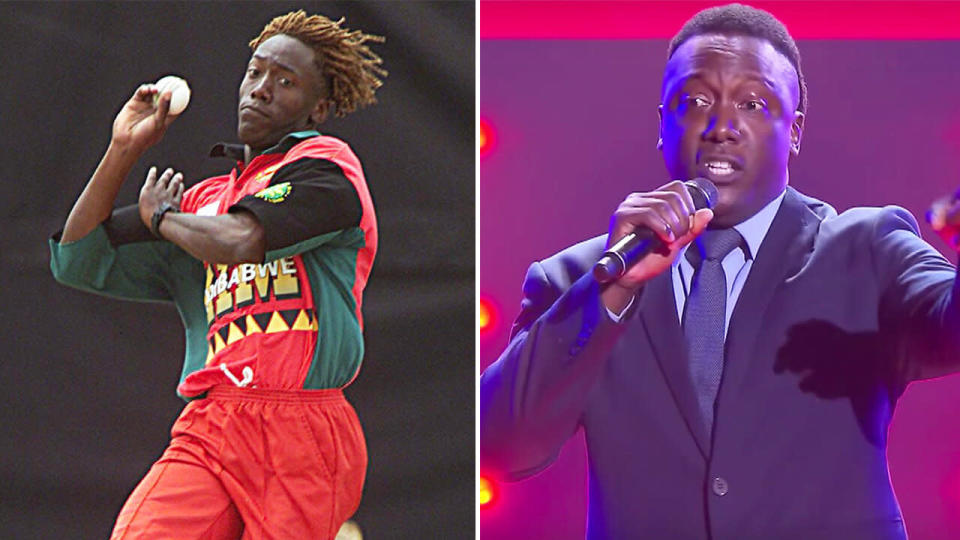'The reason I'm alive is the weather': Former cricketer's extraordinary journey from exile to The Voice
Henry Olonga is best known as the former Zimbabwean cricketer who protested against dictator Robert Mugabe during the 2003 Cricket World Cup.
More recently he has returned to the limelight thanks to his show-stopping performance on The Voice Australia. But had it not been for a washed out cricket match, Olonga may have never had that chance.
Henry Olonga for PlayersVoice
The reason I’m still alive today is the weather. At the 2003 World Cup (held in South Africa, Kenya and Zimbabwe), we were faced with the prospect of drawing or beating Pakistan in our last group game to progress to the tournament’s second phase, the Super Sixes, which would be held entirely in South Africa.
If we made it, I’d be getting out of Zimbabwe.
It was looking bleak, in more ways than one, when Pakistan flew to 3-73 off 14 overs. There was no way we were going to beat them. They had Wasim Akram, Waqar Younis, Shoaib Akhtar – and that’s just the bowlers.

But then – it rained. And it kept raining. The match was called off, and with no reserve day, we were off to South Africa.
Once we got there, my girlfriend in Zimbabwe broke off our relationship. I now had absolutely no reason to return.
Yet the scariest part was to come.
We lost our first two Super Sixes games (I played in the second one), and were out of the running by our third and last match, against Sri Lanka in Port Elizabeth.
During the game, we noticed what we thought were police officers from Zimbabwe, sitting in a VIP box. Our security men then confirmed this was the case. We concluded they were probably there to escort myself and Andy Flower back to Zimbabwe and into the fire.
The match ended (we lost), and I quickly released a statement saying I’d retired from international cricket, while reiterating I was standing by my protest. Team officials then said I couldn’t ride on the team bus, though Andy could.
I was out on my own. Thankfully, I hitched a ride to the hotel with our security guys.
I had a nervous couple of days before flying with the squad to Johannesburg (after making my own way to the airport). From there, I left the team and went into exile – quite sad that only two guys, Douglas Hondo and Tatenda Taibu – bothered to say goodbye.
I’d arranged for friends in Jo’burg to pick me up from the airport and I stayed with them for about a month, still a bit worried that the Zimbabwe police might be after me.
Finally, I was given an air ticket to London by a wonderful American man who’d heard my story and who fortunately owned an airline.
In England, I worked in TV and radio commentary and worked and played for the renowned cricket entertainment club, the Lashings International XI, and did some after-dinner speaking/singing engagements.
I became reacquainted with an Australian girl named Tara Reed, who I’d met while having my bowling action corrected by Dennis Lillee in Adelaide years earlier. After a few more years in London, we moved to Adelaide in 2016.
